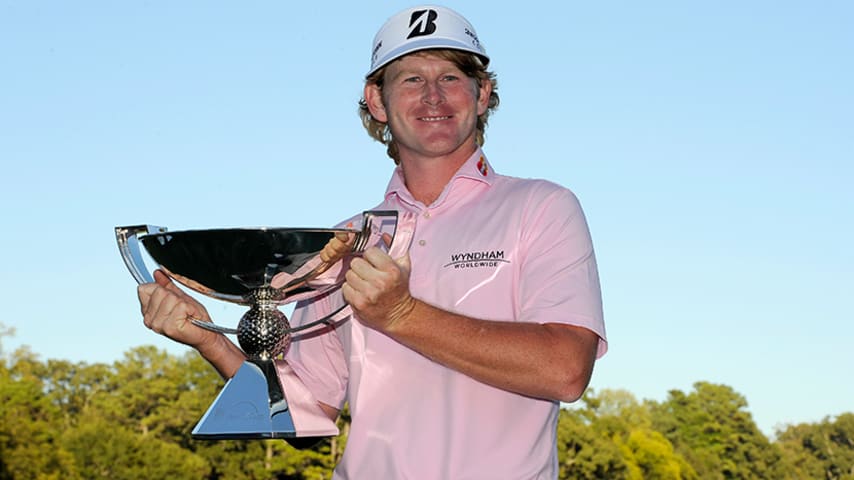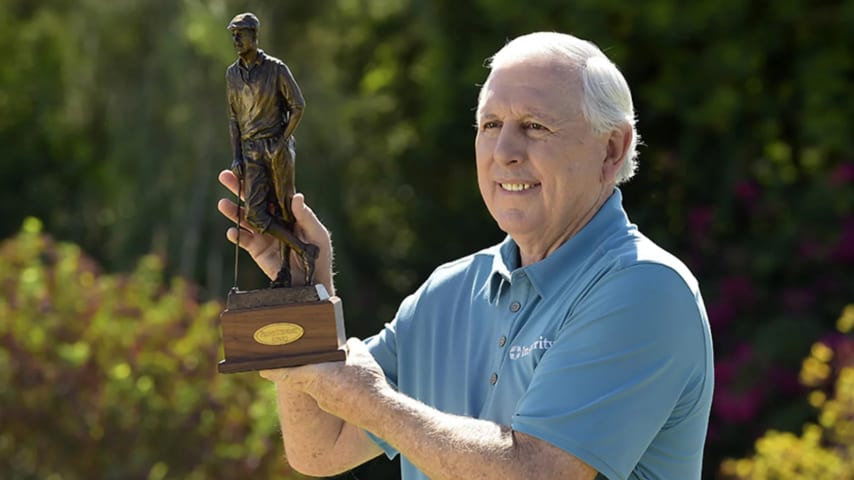The case of Bobby Jones' missing medal
6 Min Read

Written by Helen Ross

Buy a Mulligan: Brandt Snedeker
Bob Jones IV didn’t even know the medal was missing.
His grandfather, the man he called Bub but we all know as the legendary golfer Bobby Jones, had given it to his grandmother, Mary, to wear on a chain around her neck. She, in turn, had given it to his mother, who passed it along to him to give to his wife.
The medal, which is slightly larger than a silver dollar, is the one Jones received when he won the 1927 Southern Open. On the front is the crest of the Southern Golf Association while the back is engraved in 14-carat gold with the words: Open Championship, Atlanta, March 1927, Won by Robert T. Jones Jr., 281 strokes.
What the younger Jones didn’t know is that serious golf collectors had wondered where it was ever since his grandfather donated all his championship medals to the United States Golf Association. The medal was the only first-place award not in the collection.
One day, Jones and his wife, Mimi, who happened to be wearing the medal, walked into a reception. A good friend, Sidney Matthew, the Tallahassee, Florida lawyer who is one of the foremost experts on all things Bobby Jones, immediately took notice.
“Oh my God, it’s the missing medal,” Matthew gasped.
Jones was nonplussed by Matthew’s reaction. “Sid, I appreciate your enthusiasm, but I have no idea what you're talking about,” the clinical psychologist remembers saying.
“And he told me, we have been wondering for a long time what ever became of that Southern Open medal from 1927. And I said, well, you obviously didn't ever ask me, or I could have told you that it was around the neck of my wife at any major golf event.
“He was just bowled away by it.”
Jones doesn’t know why his grandfather kept the medal, but he does have a couple of ideas. One, he felt strongly about his Southern heritage and the Southern Golf Association. Two, the eight-stroke victory came at his home club of East Lake, where the 63 he shot in a practice round had everyone buzzing.
“You’ve got to admit, especially after a 63 in the practice round that, that Bub would definitely have enjoyed a home field advantage on that course,” Jones says.
Jones, who will hit the opening shot at the TOUR Championship on Thursday, said he was a teenager before he fully grasped his grandfather’s accomplishments in the game. By the time his grandson was born, the elder Jones was suffering from the debilitating effects of syringomyelia, where a fluid-filled cavity forms in the spinal cord.
He was eventually confined to a wheelchair. Jones remembers pushing his grandfather, the man who won the Grand Slam in 1930, to the elevator at his house and then meeting him on the first floor to push him out to the car. He’d do the same when his Bub returned from work.
“I don't have memories that are your typical grandfather, grandson memories because he was an invalid for all my life,” Jones says. “For example, I cannot recall a time in my life when my grandfather even hugged me because he never had the use of his arms.”
The two were close, though. Jones remembers wanting to give his grandfather a gift and how his 3-year-old self was attracted to the silver globe that the Metropolitan Golf Writers Association have given him to commemorate the Grand Slam. Sticking out of the globe were appropriately-placed flags to show where the U.S. Open, British Open, U.S. Amateur and British Amateur – which were the major championships of that era – had been held.
Jones wrestled the flags off the globe and proudly went to The Sanctum, the room off his grandfather’s bedroom named after the crimefighter’s headquarters on the radio show, “The Shadow,” to give them to him. To say some of the adults were aghast might have been an understatement.
“My grandmother turned a shade of white, it was like death-pale white,” Jones recalls. “And my father got a look on his face that said I had but seconds to live, and my grandfather just sat there, and he said, son, that was so sweet and so thoughtful of you and I really appreciate it.
“He said, now go ahead and give those to your grandmother, and the next time you just make sure to ask your grandmother before you bring me any more presents.”
Jones, who practices at the Behavioral Institute of Atlanta in Sandy Springs, Georgia, says his grandfather rarely discussed his own accomplishments in the game. While his grandfather had a phenomenal memory – “Bub rarely needed to consult a law book when he was putting together a brief,” Jones says -- he wasn’t one to talk about the great shots he hit.
“I think that was for a couple of reasons and this is probably where my being the psychologist is going to show a little bit,” Jones says. “One is he was just by nature, a very, very present-focused man. He did not like to dwell on past glories. In fact, he used to have a favorite poem that the last two lines were: Do not expect you can ever collect for the hero you used to be.
“And I think that also served another purpose for him. And that was that with his illness, I think it would've been too demanding for him emotionally … for him to think back on the days when he had all of his physical faculties. So, he just stayed right in the immediate manner.”
Jones says he always knew his grandfather had done some really “fantastic stuff,” but that it was almost like he was two different people when he was a little boy.
“There was Bobby Jones who was part of that Thomas Stevens painting of him -- the relaxed champion athlete,” Jones recalls. “And then there was Bub, who was my grandfather who was, well, as we called it at the time, crippled.
“It wasn't until I was about 16 or 17, and I saw the Warner Brothers films for the first time, and I heard Bub's voice coming out of the body of this athlete that it really hit me. Two things really hit me at that point. One was that, you know, this was the same man, this was not two different people. It was the same man.
“And it also started to hit me, although it took a while, but it also started to occur to me the magnitude of what it was that had befallen him.”




